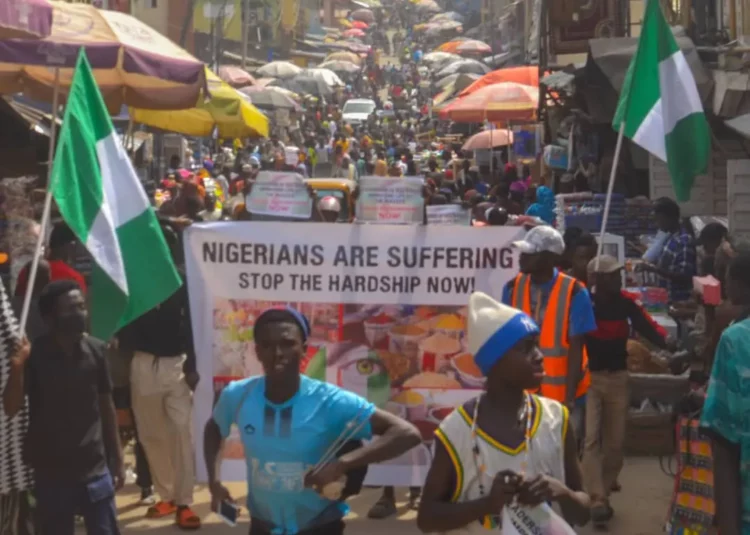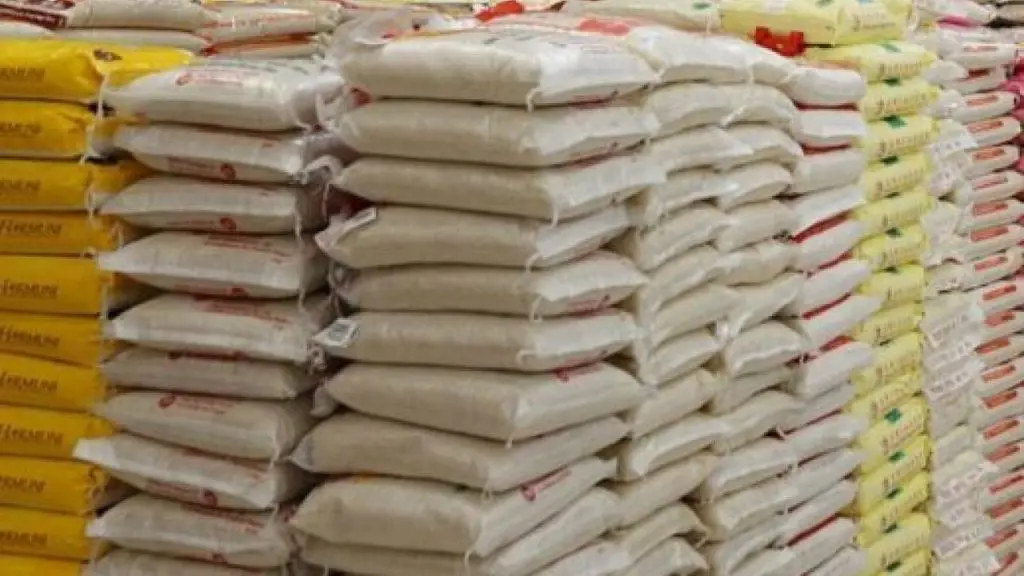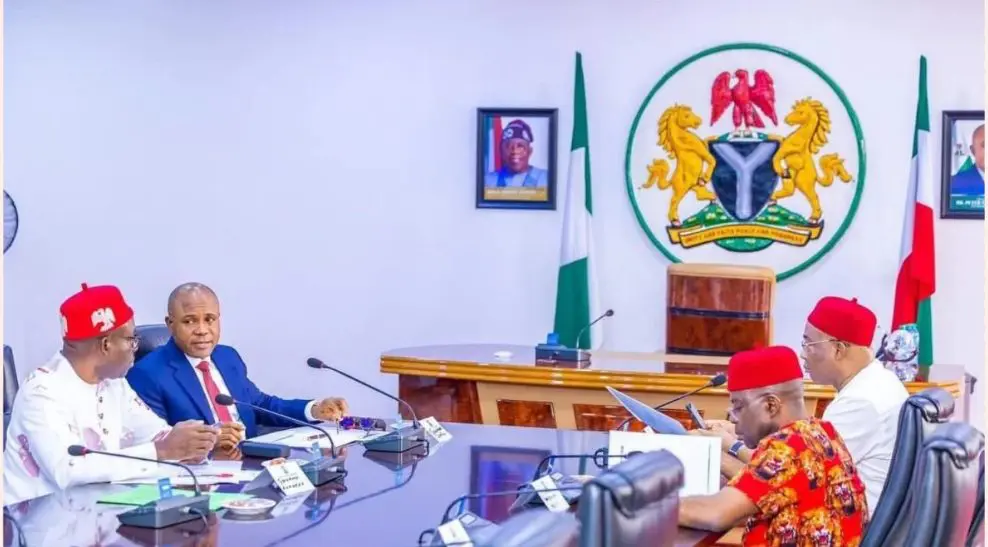News
Issues Around Hunger Protests In Niger

Fears have arisen in Niger State due to protests and the hijacking of a truck carrying food by enraged youths and women.
Earlier this month, a group of women staged a protest against the high cost of living and resulting hunger. However, the protest escalated when some youths joined in, blocking the Kpagungu axis of Minna-Bida Road.
The women carried placards with messages such as “No food, we are dying of hunger,” and “Govt: Control food prices before we die of hunger,” demanding improved living conditions and reduced costs.
This protest led to traffic congestion on the busy Minna-Bida Road, a crucial route linking the North-Central and North-West to the South-West of Nigeria.
Aisha Jibrin, considered the initiator of the protest, and 24 others were initially arrested but later released.
More recently, two days ago, protesters seized trailers loaded with food in Suleja, prompting security forces to intervene. This marked the second major protest in the state, with youths obstructing numerous trailers traveling from Abuja to Kaduna.
The youths set fire to tires on the road and began looting bags of grains, rice, and beans before security personnel dispersed them with force. Despite the intervention, several bags of food were already taken.
The Niger State Police Command’s Public Relations Officer, DSP Wasiu Abiodun, confirmed the protest and subsequent police action to clear the highway.
Niger State Governor, Mohammed Bago, attributed the hunger protests to the activities of food speculators, whom he accused of hoarding and transporting food out of the state. He issued an executive order to halt this practice, authorizing the confiscation of trucks found loading food supplies in rural markets.
The recent events have raised questions about the extent to which such actions are permissible, with concerns voiced by various stakeholders. Comrade Abdullahi Jabi, Chairman of the Coalition of Civil Society Organizations, North Central Zone, urged for a more productive approach to engage and mobilize youths, cautioning against politicization of the issue.
Efforts to reach Senator Mohammed Sani Musa, representing Niger East, for comment on the alleged neglect of youths in his constituency, were unsuccessful.
Prominent political figure in Minna, Yahaya Idrees, accused the senator of detachment from his constituency, particularly amid the recent protests. The protests largely occurred in Niger East, where the senator was expected to undertake empowerment programs.
Observers emphasize the need for collaborative efforts beyond the state government, suggesting the involvement of both legislative and executive arms in addressing the root causes of the unrest.
Social scientist Mohammed Farouk attributed the recent behavior of youths to economic and social deprivation, emphasizing the importance of empathy and servant leadership from those in positions of authority.
News
Why rice price is decreasing in Nigeria – Millers

The Association of Rice Millers has attributed the nationwide decline in rice prices to the reopening of the Nigeria-Niger border. Jonathan Joshua, the chairman of African Rice Millers in Nasarawa, conveyed this information in a statement.
Joshua, who also serves as the national president of the Association of Small-Scale Agro Producers in Nigeria, highlighted that the price of rice is anticipated to decrease even more in the next couple of months with the onset of harvest.
“Some mills that ceased operations due to a shortage of paddy last year and earlier this year are now resuming production as they can easily acquire the grain from neighboring countries following the reopening of the Nigeria-Niger border,” he stated.
“We anticipate further decreases in paddy prices when farmers begin harvesting in two months,” he added.
Despite the inflation rate rising to 33.20 percent in March 2024, rice prices have decreased by 19 percent.
News
Dislodged criminals relocating to rural communities – Abia govt alerts citizens

The Abia State government has reported that suspected criminals, who were previously displaced from their hideouts by the state’s joint security team, Operation Crush, are now relocating to other parts of the state, particularly rural communities, in order to evade detection by law enforcement.
This relocation, as stated by the state government, aims to avoid potential identification by security forces. The concern was raised over the weekend by Navy Commander Mac Donald Uba (Rtd), the Special Adviser on Security Matters to Governor Alex Otti, in a press release.
Uba urged residents of Abia State to remain vigilant regarding the movements of such criminal elements in their vicinity. He also appealed to traditional leaders, Presidents-General, village heads, and village chairmen to promptly report any suspected criminals or individuals with questionable backgrounds to the nearest police station or other security agencies.
News
RUGA: South-East governors living in deceit, denial – Intersociety

The International Society for Civil Liberties and Rule of Law (Intersociety), a non-profit organization dedicated to human rights and democracy advocacy through research and investigation, has accused South-East governors of proceeding with the establishment of Fulani herdsmen settlements across the region.
In a statement provided to DAILY POST on Monday, Intersociety alleged that many of these governors had their elections manipulated and were now executing the agenda of influential figures.
The statement, signed by Emeka Umeagbalasi, Chair of the Board; Chinwe Umeche, Head of Democracy and Good Governance Program; Obianuju Igboeli, Head of Civil Liberties and Rule of Law; Ndidiamaka Bernard, Head of International Justice and Human Rights; Ositadinma Agu, Head of International Contacts and Mobilization; and Chidinma Udegbunam, Head of Campaign and Publicity, warned of dire consequences if South-East lands were handed over to herdsmen.
Intersociety cautioned that the actions of the governors could potentially transform the South-East into a region prone to jihadist violence similar to Benue, Plateau, and Southern Kaduna. Despite previous warnings, evidence suggests a looming threat to the security and safety of the South-East and its inhabitants, particularly regarding freedom of religion, particularly Christianity.
The organization accused the governors of facilitating the influx of Fulani jihadists and their allies into the region, armed with illegal weapons and enjoying impunity. It suggested that the governors’ actions were motivated by their desire to maintain power, even at the cost of compromising the security and religious identity of their constituents.
Intersociety highlighted a statement by the National Leadership of the Miyetti Allah Cattle Breeders Association of Nigeria as evidence of the governors’ complicity in ceding lands to herdsmen. It noted that communal lands, forests, and farmlands in indigenous Igbo areas had been invaded and seized by Fulani herdsmen, armed with illicit firearms.
Furthermore, the organization criticized the biased stance of the Anambra State Government and accused the Enugu State Government of coercing communities to surrender their lands for Fulani settlements.
Intersociety alleged that the Enugu State Government had issued veiled directives to communities, such as Elugwu-Akwu, to hand over their lands for settlement, demonstrating a disregard for the welfare and interests of their citizens.
-

 World News7 months ago
World News7 months agoWhat we know about Israel’s war with Hamas
-

 Sports7 months ago
Sports7 months agoLaLiga: Everyone want to play with him – Vinicius on player Real Madrid should sign
-

 World News7 months ago
World News7 months agoIran calls on Islamic, Arab countries to confront Israel
-

 Tech7 months ago
Tech7 months agoTop 10 AI Skills to Learn in 2023
-

 Entertainment7 months ago
Entertainment7 months agoBET Hip-Hop Awards: Black Sherif wins big as Burna Boy loses seven nominations
-

 Entertainment6 months ago
Entertainment6 months ago‘Black Panther’ star Lupita Nyong’o breaks up with boyfriend, Selema Masekela
-

 ICT8 months ago
ICT8 months agoApple Bows To EU, Unveils iPhone With USB-C Charger
-

 World News7 months ago
World News7 months agoZelensky seeks defences for winter on visit to NATO






